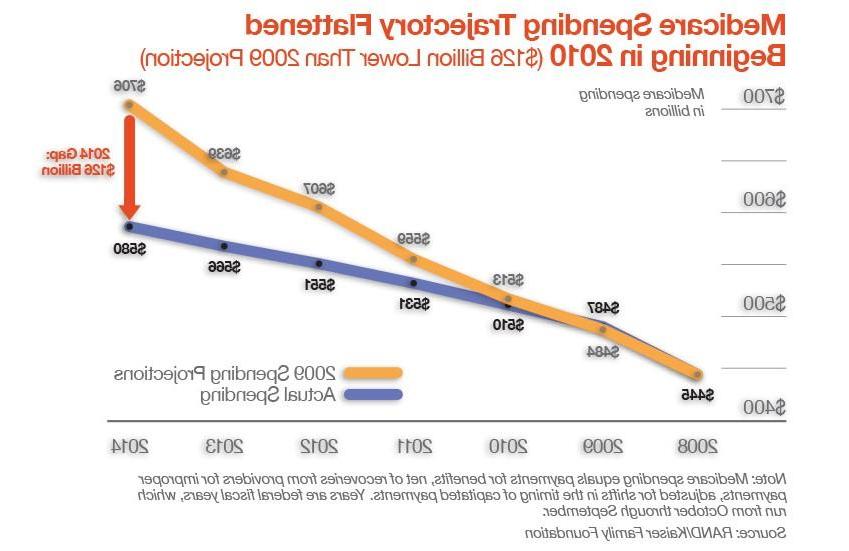看看事情发生变化的原因
编者按:一个稳定的逐步设计的医疗保险计划显然是支持科罗拉多人长期健康和生活方式需求的一个关键. 超过775,科罗拉多州有1000人,其中大部分是老年人, 但一些符合条件的年轻人通过联邦医疗保险计划获得医疗保险和护理. 多年来, 分析人士发出震耳欲聋的警告,称婴儿潮一代的退休将导致联邦医疗保险破产,并摧毁联邦预算. 2014年和2015年, updates from actuaries showed a stunning turnaround: Medicare was getting healthier. Per capita Medicare spending not only flattened out in 2009, 在2011年之后,它实际上略有下降——这是一个习惯了高医疗通胀冲击的项目中前所未有的发展. 以实际美元计算, the savings are in the hundreds of billions: Actual Medicare spending in 2014 was $580 billion, while as recently as 2009 the projection for that year foresaw $706 billion in spending. 我们请凯撒家庭基金会的卫生保健分析师朱丽叶·库班斯基向我们介绍了医疗保险的前景如何以及为什么发生了变化. 库班斯基来自加州门洛帕克., is associate director of the Program on Medicare Policy at KFF.
在最近之前, more optimistic analyses of the Medicare spending slowdown, what had been the worries and the predictions about the program and its supposedly untenable costs?
这可以归结为人口老龄化的一个简单事实:加入该计划的人数太多了, 当他们65岁时,他们就有资格享受医疗保险了. The growth in that population has been a cause for great concern; holding everything else constant, 如果有更多的人加入这个项目并且人均成本以历史上的速度增长, there were real concerns about Medicare having a shortfall in financing. 问题是人口老龄化的速度超过了我们增加劳动力的速度. 因此,有一些非常严重和可怕的预测,医疗保险没有足够的钱来支付所有的医院福利,这些福利将在相对较短的时间内到期.
In 2009, 就在六年前, the Medicare trustees were projecting that the Medicare hospital insurance trust fund, 这些工资福利都到哪里去了, 难道到2017年就要没钱了,没有足够的钱支付目前的医院账单吗. 那时候真的是近在咫尺. 这就是大局.

We keep hearing the statistic that boomers are turning 65 at the rate of 10,000 to 11,000 a day. 这难道不应该威胁到整个系统吗?
That started in 2011, when the baby boom generation started turning 65. Prior to then, the population growth had been a coming concern, but it hadn’t come yet. After 2011 is when that number you tossed out became a reality. 婴儿潮人口将持续20年现在才有资格享受医疗保险.
And so financially for the Medicare system, what has happened instead of those more dire projections?
One point of comparison: I mentioned in 2009 the trustees were projecting the date of insolvency would be 2017; now in their most recent report for 2015, they are projecting the insolvency date is pushed out to 2030. That’s one clear indicator of Medicare's improved financial health.
So instead of eight years of solvency, we have at least 15 years of solvency?
这是正确的. So there we have a clear indicator that Medicare spending projections are not completely under control, but certainly more under control than they were five or six years ago.
So what have you and other analysts found as you've dug into the numbers? 为什么成本的上升速度没有预期的那么快?
In our 2014 paper, we tried to look at what happened that year. 有一些明显的解释因素, some not so obvious and some residual results which we cannot explain. The obvious reason is that the (Affordable Care Act) passed, and that included many provisions affecting the Medicare program and Medicare spending. They were implemented as early as 2011; others rolled out over time. 基本上,供应商的支付会减少,而这些支付会随着时间的推移而增长. 这是一种明显而直接的方式,可以使医疗保险支出受到更多的控制——现在就削减开支,并将未来对增长速度的限制纳入立法.
改革的支持者们希望这些努力能够站稳脚跟,更多的人会支持他们 ... 这个体系将会改变,我们不需要对医疗保险计划进行全面重组.
Another big factor is the reduction in payments to Medicare Advantage programs, 这是传统医疗保险的管理式医疗. 从历史上看 they have been paid more to provide the same benefits; that plan got paid more than if the person had stayed in traditional Medicare. 多年来,一些立法者一直对此感到困扰, and they were finally able to restructure and level the playing field. 随着时间的推移,它会逐步出现.
增长的平缓是否可以归因于全国范围内医疗保险的各种支出和护理实验?
There are some other provisions in the ACA that might be contributing factors, but we can’t assign dollar savings to them because it’s too early to tell what role, 如果有任何, 他们在玩. 比如(问责制医疗机构), 医疗保险共享储蓄, 绑定支付, 家庭独立项目——许多这样的倡议、演示和试点正在不同的地方展开. It’s really hard at this relatively early stage of the game to evaluate how successful these are. 我得说,有些已经显示出些许希望的迹象, 但与花费数千亿美元的整体计划相比,这是数千万或数亿美元的节省. They would have to be rolled out on a much larger scale in many more parts of the country.
你们2014年报告第一页的图表显示了近年来人均患者支出趋于平缓. 这很重要吗??
这绝对是件大事. 从历史上看, 人均消费刚刚上升, and I think people expected that as a fact and not something you could really do much to change. So the fact that spending trend has been relatively flat is really unprecedented in Medicare. There are some other changes, besides the experimentation I mentioned, that could be significant. 例如, growth in prescription drug spending has been much lower per person than it had historically. While prescription drugs are only about 10 percent of Medicare spending, that trend line does have an effect on the overall Medicare trend line. More people were shifting to generic drugs; fewer blockbuster brand name drugs (were) being introduced. And a lot of the more popular brand name drugs lost patent protection and had generics become available.
There are some other things possibly related to delivery system reform. There have been large relative reductions in the hospital readmission rate. Hospital spending is roughly about one-quarter of annual Medicare spending, 所以这牵涉到很多钱, and clearly Medicare would be happy to see a successful effort in this area.
通常所说的废物是什么, fraud and abuse - (Medicare has) tried a lot of things in recent years. 其中一个领域是家庭健康支出, some pretty egregious examples of fraudulent providers; (Medicare's) efforts have been pretty successful, according to the Office of Inspector General and others.
我敢肯定,立法者们想知道,所有这些收紧措施是否会使消费者的满意度或质量评级变得更糟.
在凯撒,我们不太关注这一点, but I'd say the quality measures that have been around for a while, I haven't seen any indication that quality of care has suffered as a result of these initiatives. If anything, Medicare may be sorting out the good from the bad in these integrity efforts. 很难找到证据表明,这些努力对获得医疗服务产生了负面影响. 大多数人说他们对老年医疗保险非常满意这在老年医疗保险的历史上以及我们提出这个问题的历史上都没有太大的变化.
Has the flattening of costs changed the tenor of the long-term debate about Medicare?
是也不是. 我认为这取决于你听的是谁. 有一些政策制定者更关注最近十大菠菜靠谱老平台医疗保险支出的新闻,并将其视为ACA和支付改革有效性的证据, 许多人希望在这些改革上加倍努力,在这些倡议上做得更大、更大胆. 但其他政策制定者似乎不太关注医疗保险最近的历史,而是在谈论提高医疗保险的资格年龄和福利设计,并转向保费支持模式. 这些想法旨在解决可能被视为医疗保险的长期问题:人口老龄化正在发生. 不管你现在对医疗保险做什么, the fact is we are going to have upwards of 80 to 90 million people on Medicare in a few decades. And that is the reality that I think many people feel has still not been addressed.
改革的支持者们希望这些努力能够站稳脚跟,更多的人会支持他们, and as providers get more used to living with 绑定支付 and the experiments take hold, 这个体系将会改变,我们不需要对医疗保险计划进行全面重组. 仍然有一些人在哲学上反对医疗保险,因为它现在存在,并希望它在未来成为一个不同的项目.
There are kind of two realities going on for policymakers, 这取决于你站在过道的哪一边:你对整个医疗保健系统的看法,以及你对医疗保险制度的看法.
This article was originally published in the Fall 2015 issue of Health Elevations.
